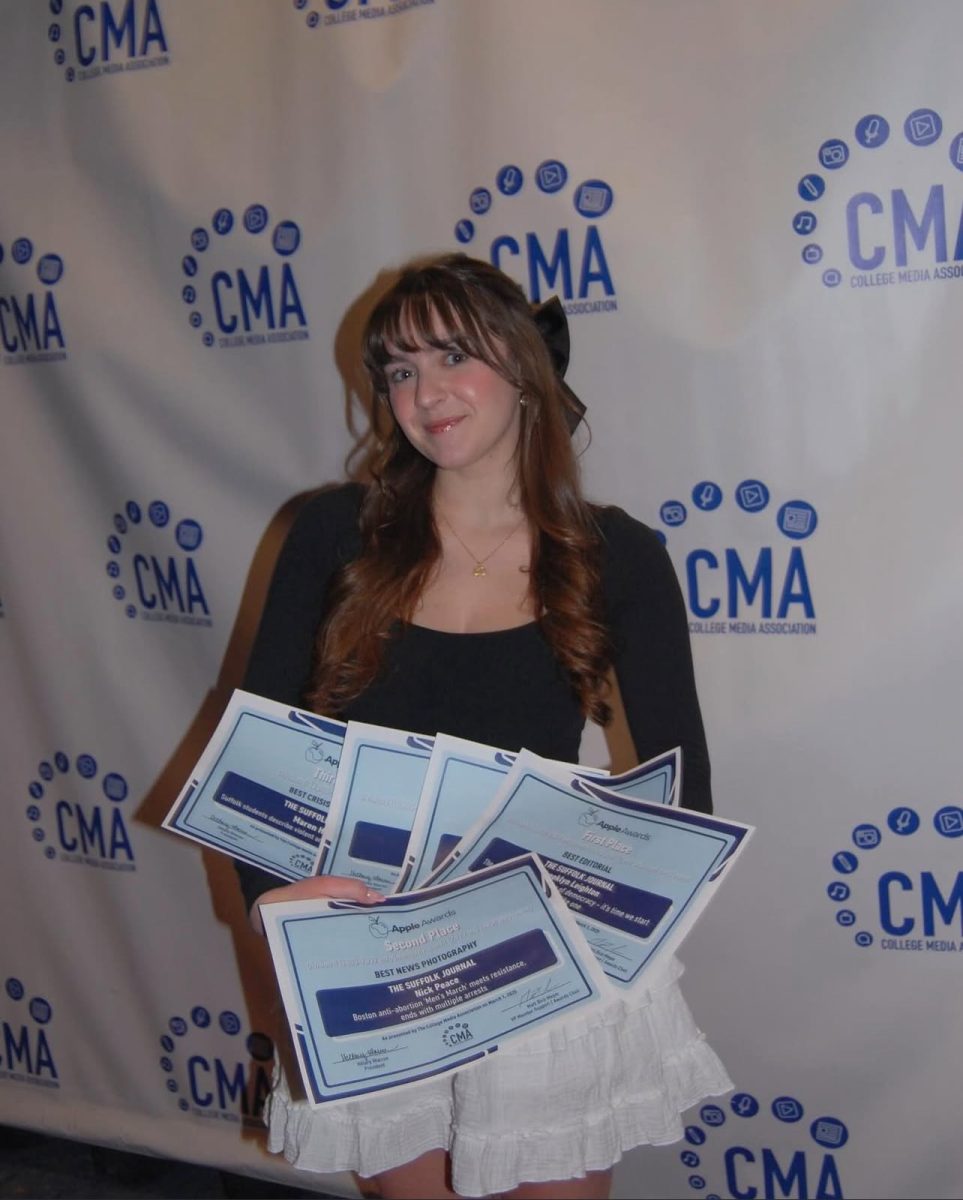Dear Suffolk Students,
Finals week is near and we’d like to wish you all the best of luck with the end of the semester. SGA will continue to work over the break, so if you experience any difficulties or challenges with life at Suffolk, please feel free to reach out to us at [email protected]. We will provide any assistance that we can.
Please be sure to follow SGA on all of our social media accounts to keep up with what we have going on, including the weekly posting of our previous week’s minutes. You can find us on Facebook, Twitter, and Instagram @SuffolkSGA.
The library will have extended hours for finals week, so be sure to look out for those over the next two weeks.
SGA will be holding and attending numerous events next semester, so be sure to look out for us on campus!
The Student Government Association holds its weekly general meeting on Thursdays from 12:15 – 1:30p.m. in Somerset room B18. Our meetings are open to all members to the Suffolk community to come listen or share your concerns during our open forum.
If you have any questions or issues and do not want to attend our meetings, you can email us, contact us on social media, or reach out to your class senators. You can find a list of your class senators at: http://www.suffolk.edu/documents/SGA.pdf.pdf.
Good luck next week on finals, we hope you all have a safe, fun and relaxing winter break!
-Student Government Association






Wayne Perry • Jan 1, 2017 at 6:24 pm
Rationalization recommendations for the Governor’s Council Hearings and Sessions
The Governor’s Council existence is defined in the State’s Constitution of 1780. It consists of 8 councilors and was amended in 1854 for the councilors to changed to elected officials to represent a district without being required to be a resident of the district they represent. The official Mass.gov website states the councilors reside in their districts, but the Secretary of the Commonwealth (who is responsible for the elections) states clearly that only residence in the state of Mass. is required to run for an be elected a councillor. Anybody in the state can run for any council seat irrespective of residence location.
The council is a consultative body, not a deliberative one like the legislature. There are no committees, reports, party leaders or any of the legislature practices or procedures. The council is only chaired by the Governor, or in the absence of the Governor by the Lt. Governor. The Lt. Governor is a voting member of the Governor’s council except when filling in for the Governor to chair the meeting in which case the Lt. Governor does not vote. Membership in the Governor’s Council is one of the very few official jobs given to the Lt. Governor by the state constitution. 5 Councilors are required to form a quorum for a meeting, and the council can only be called into session by the Governor who will chair, or it is chaired by the Lt. Governor in the absence of the Governor. Governor Council members outside of a session chaired by the Governor or Lt. Governor are no more than a group of private citizens of the Commonwealth who may meet in a room in the state house that is lent to them as a courtesy but has no legal or constitutional existence. Governor Councilors are only part time elected officials and paid appropriately, $36,035 per year (which includes a $10,000 increase in 2015) compared to the $60,932 for a State Representative who has a much smaller representation. The recently approved pay increase may apply to the Council members but definitely applies to the state rep.
Hearings held by council members in any room lent to their use in the state house without the Governor or Lt. Governor attending and chairing are as a courtesy posing as an official state office and as it is only a pose the varying testimony given under oath has no legal or official existence. The allowance of this by no means universal practice is only a courtesy and subject to the personal whims and fancies of whoever may chair the gathering of councilors who may want to conduct a hearing of judicial nominees in public.
Human vanity being a constant in all ages, civilizations, cultures and places, it rationalizes and excuses itself as tradition. And frankly the current practices of the Governor’s Council meeting for hearings are often called traditions, yet they are in fact rules become both broken and stupid.
Pandering to the conceit that one person knows the hundreds of thousands of resident in their district and for that reason has the right to chair the hearing of a nominee from that district, and decide the choice of time and date is absurd, yet it is the “Tradition”. And the December 14th meeting (youtube tinyurl.com/Dec14thGC) shows up the stupidity and broken operations of the current councilor practices that are referred to as tradition.
As the next session of the Governor’s Council will start on January 5, 2017 with a new member the following suggestions are made for improving the hearings and sessions
Judicial Hearings not chaired by the Governor or Lt. Governor
1.) All regions of the Commonwealth are to be treated equally by a rotational roster system of hearing chairmanships. This will both spread the burden and experience of the chairmanship evenly and eliminate the current population bias inherent in geographic population density. The name of chairperson for the particular hearing to be posted on the Governor’s Council website along with the date and time of the hearing. – Special note, as the position of Governor’s councilor is a part time job and paid accordingly, members need gainful employment to make ends meet, Inevitably in modern life with its’ many vicissitudes a scheduled councilor will not be available for a particular scheduled hearing, then the next councilor on the chair roster would chair.
2.) Hearing times standardized to be held on Wednesday’s starting at 9 am and 1pm and to be fora duration of 3 hours for judicial nominations. Pardon and commutation hearings in this century have been both rare and infrequent and will best be served by consensus of the council if and when they ever come up again. Rationalization of the current council judicial nomination hearing practices which can be viewed on youtube at tinyurl.com/Dec14thGC of the December 14th hearing requires the blending of efficiency, fairness and expediency. Standardization of hearings is not to exclude access of the councilors to the nominees and as frequently recorded all the councilors have talked to in person or by phone to all the nominees before and after the hearings. As is only to be expected by any executive department making a hiring decision. — Hearings need to start on time; it is not acceptable to delay a hearing only to meet the needs of an individual councilor if the nominee and witnesses are there and any councilors are also there then the hearings are to proceed. When the chair for that particular hearing is delayed or unable to attend; by consensus the attending councilors decide on a chair and proceed. — Rationalization of time is to allow 15 minutes if needed for each councilor to question the nominee. —- The nominee presentation to be assigned 15 minute for their peroration. — The current curious practice of nominees to bring their own boosters as witnesses to accompany the nominee to speak on behalf of the nominee; the total amount of time to be allowed for this curious practice is 15 minutes per hearing, within which time all witnesses may speak and all questions asked. — Public Comments are welcomed and encouraged and a reasonable amount of time should be given to each member or group of the public to speak as is consistent with the Massport and MBTA board of directors meetings. A few minutes per person or group within an allotment of 15 minutes for the purpose as a guide which can be adjusted upon pressing particulars. In following the practices of Massport and MBTA the presenters of public comment are not subject to cross examination, have the right to make their statements and any councilor finding this exercise of right objectionable would best serve the commonwealth by resigning their office. —– In the full usage of the aforementioned time rationalization allotments, 15 minutes is left for any follow ups of the nominee by the councilors who may have interest to do so.
3.) Nomination hearings chaired by the Governor or Lt. Governor can, if the chair desires it, ask the nominee and the nominees witnesses to swear to make statements under penalty of perjury. The right of such a chaired council to require such an oath is a matter for the governor’s legal counsel and the courts to determine. No known case of prosecution by said nominees of witnesses have ever been recorded howsoever a hearing chaired by a councilor has no constitutional existence and is unable to require or enforce such and oath. Further, the Governor or in the Governor’s absence the Lt. Governor has the sole right under the constitution to call a meeting of the council, to chair it and to conduct a hearing. This right, as should be obvious, superscedes any chairmanship of any scheduled hearing.
Council Session chaired by Lt. Governor or Governor
1.) In the current session which is coming to end and as only a handful of sessions have been chaired by the Governor, the Lt. Governor LG will be referenced as calling together, chairing and adjourning the meetings notwithstanding that the Governor can do so at any time. It is reasonable to follow the current practice that upon the Governor submitting to the Governors Council the nominee approved by the judicial nominating committee that the council agree on when to have the hearing. For the sake of expediency the councilor of the district whereupon the nominee resides will contact the nominee concerning the ability and availability of the nominee to attend one of the regular schedule hearing slots and so inform the assembled council. Said councilor is not necessary to make a physical attendance at said assembled meeting and a written notification sent to the LG and all the councilors will suffice.
2.) Voting on judicial nominees for appointment approval at the Governors Council session, the correct procedure which has been ignored and abused for too long is to have discussion after the motion to vote has been moved and seconded. Statements by councilors both extempore and written and read are made during the discussion period. And when discussion is finished or the question is moved the roll call vote is taken and statements are not allowed during voting. This principle of fairness and proper procedure has been violated frequently but not uniformly. — It is further to be noted that the state constitution does not extend to the Governor’s Council the Congressional immunity extended by the Federal Constitution to members of Congress of the immunity from prosecution for slander and libel. In plain speech councilors indulging in character assassination can be sued.